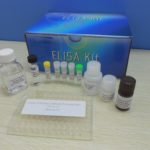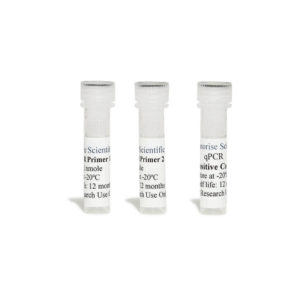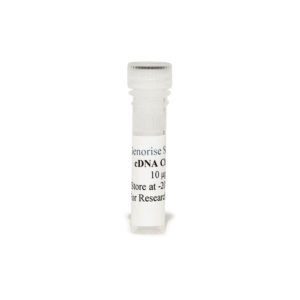Recombinant Canine MMP2 Protein
$99.00 – $285.00
The recombinant canine MMP2 protein is derived from in vitro expression of canine MMP2 gene in E. coli and purified using his-tag affinity column and can be used in multiple applications such as cell culture, ELISA and western blot.
Alternative names for MMP2: Matrix metalloproteinase-2 (MMP-2), 72 kDa type IV collagenase, gelatinase A
This product is for Laboratory Research Use Only not for diagnostic and therapeutic purposes or any other purposes.
- Description
- Product Citations
- Reviews (0)
Description
Genorise Recombinant Canine MMP2 Protein Summary
Alternative names for MMP2: Matrix metalloproteinase-2 (MMP-2), 72 kDa type IV collagenase, gelatinase A
Alternative name for equine: horse
Product Specifications
| Purity | > 96%, by SDSPAGE under reducing conditions and visualized by silver stain. |
| Endotoxin Level | < 0.1 EU per 1 μg of the protein by the LAL method. |
| Activity | Measured by its ability to cleave the fluorogenic peptide, Mca-PLGL-Dpa-AR-NH2 (Catalog # ES001). The specific activity is >1.000 pmol/min/µg as measured under the described conditions. |
| Source | E. coli derived canine MMP2. |
| Accession # | XP_013964882.1 |
| N-Terminal Sequence Analysis | Tyr |
| Amino Acid Sequence | Tyr34 –Cys584 |
| Predicted Molecular Mass | 61 kDa |
| SDS-PAGE | 61 kDa, reducing conditions |
Background:
Matrix metalloproteinase-2 (MMP-2) is known as 72 kDa type IV collagenase, and gelatinase A is an enzyme that is encoded by the MMP2 gene.(1) Proteins of the MMP family are involved in the breakdown of extracellular matrix in normal physiological processes, such as embryonic development, reproduction, and tissue remodeling, as well as in disease processes, such as arthritis and metastasis. Most MMP’s are secreted as inactive proproteins which are activated when cleaved by extracellular proteinases. This gene encodes an enzyme which degrades type IV collagen, the major structural component of basement membranes. The enzyme plays a role in endometrial menstrual breakdown, regulation of vascularization and the inflammatory response.
Activation of MMP-2 requires a proteolytic processing. A complex of membrane type 1 MMP (MT1-MMP/MMP14) and tissue inhibitor of metalloproteinase 2 recruits pro-MMP 2 from extracellular milie to the cell surface. Activation then requires active molecule of MT1-MMP and auto catalytic cleavage. Clustering of integrin chain promotes activation of MMP-2. Another factor that will support the activation of MMP-2 is cell-cell clustering. A wild-type activated leukocyte cell adhesion molecule (ALCAM) also required to activate MMP-2. Mutations in the MMP2 gene are associated with Torg-Winchester syndrome, multicentric osteolysis and arthritis syndrome.(2) MMP2 has been shown to interact with THBS2,(3) TIMP2,(4-7) Thrombospondin 1,(4) CCL7 (8) and TIMP4.(6, 7)
Reference
- Devarajan P, et al. Biol. Chem. 267 (35): 25228–32.
- Martignetti JA, et al. Genet. 28 (3): 261–5.
- Bein K, Simons M. Biol. Chem. 275 (41): 32167–73.
- Morgunova E, et al. Natl. Acad. Sci. U.S.A. 99 (11): 7414–9.
- Overall CM, et al. Biol. Chem. 275 (50): 39497–506.
- Bigg HF, et al. Biol. Chem. 272 (24): 15496–500.
- Kai HS, et al. Biol. Chem. 277 (50): 48696–707.
- McQuibban GA, et al. Science 289 (5482): 1202–6.
Product Citations
Be the first to review “Recombinant Canine MMP2 Protein”
You must be logged in to post a review.



























Reviews
There are no reviews yet.